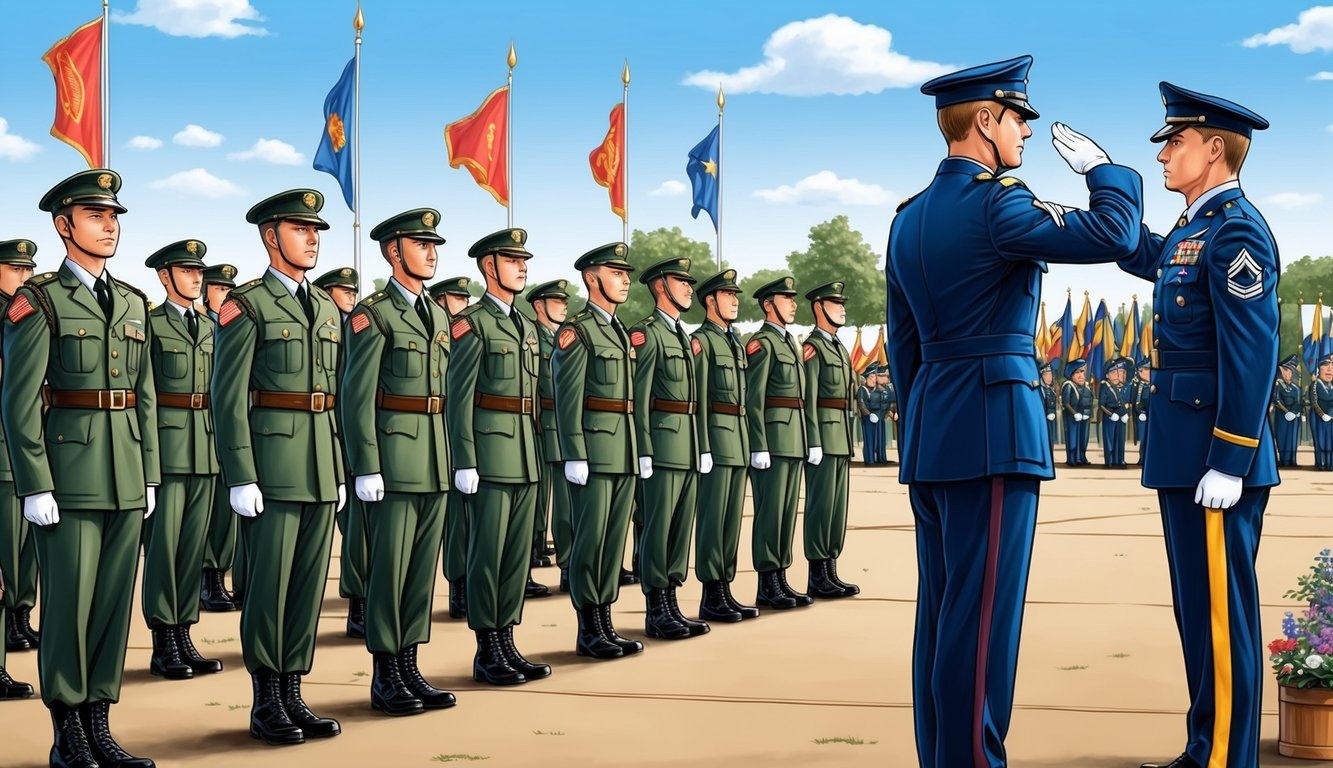“`xml
The graduation from basic training is a significant milestone in a soldier’s journey.
It represents the successful culmination of weeks filled with rigorous physical and mental challenges, transitioning civilians into proud members of the U.S. Army.
This achievement signifies your preparedness to serve and defend your nation as a disciplined and skilled soldier.
The graduation ceremony is a cherished tradition marked by formality and celebration.
Families and friends gather from various locations to celebrate the accomplishments of their loved ones, honoring this remarkable day.
It embodies a tribute to perseverance, teamwork, and individual growth.
As you approach this important occasion, you’ll feel an exhilarating blend of excitement and anticipation.
The path to this point has been demanding, but the sense of accomplishment is extraordinary.
Your graduation symbolizes the dawning of your Army career, unveiling new opportunities and experiences within the military.
Key Takeaways
- The graduation from basic training celebrates your transformation from civilian to soldier.
- This ceremony is a momentous occasion for graduates, their families, and the U.S. Army.
- Graduation signifies the commencement of your military career and future possibilities.
Your Journey Commences
Basic training initiates your transformation from civilian to soldier.
Throughout this challenging experience, you’ll develop both physical and mental strength while embracing core military values.
Enlisting in the Army
Your adventure begins when you enlist at a recruitment office.
You will take the ASVAB test to assess your capabilities and potential job roles.
Following a successful medical examination, you will be sworn in and receive your shipment date for basic training.
Prepare for a significant lifestyle change.
In the weeks leading up, concentrate on enhancing your fitness.
Engage in running, push-ups, and endurance-building exercises.
Adjust your sleep schedule by waking up earlier.
Understanding Basic Training
Basic Combat Training spans 10 weeks and is conducted at one of four main locations.
You’ll start with a reception week, where you’ll receive uniforms, haircuts, and complete necessary paperwork.
Training truly commences in week one, filled with intensive physical fitness, marching, and weapon training.
You’ll cultivate discipline, teamwork, and Army values, with days that start early and involve demanding workouts.
Classes will include military law, first aid, and tactical skills.
Field exercises will reinforce what you’ve learned, with drill sergeants urging you to excel.
Maintain focus on your objectives and support your fellow trainees.
Phases of Basic Training
In the Army, basic training comprises three distinct phases: Red, White, and Blue, each designed to build upon the last, enhancing your skills and pushing you further.
Red Phase
Commencing with the Red Phase, you’ll prioritize discipline and fitness over roughly three weeks.
This phase introduces you to military life.
You’ll learn basic drills, customs, and courtesies with rigorous physical training aimed at bolstering strength and endurance.
Familiarization with your rifle includes safe handling techniques, while classroom instruction covers Army values.
The importance of teamwork is highlighted from day one, fostering collaboration among recruits.
White Phase
The White Phase extends the foundation you’ve built during Red, lasting an additional three weeks.
Marksmanship training becomes a central focus as you practice at the firing range to refine your skills with your designated weapon.
Physical fitness remains critical, with increasingly difficult workouts.
Expect to navigate obstacle courses and engage in team-building exercises, including night training to develop skills in low-light environments.
Basic first aid and land navigation concepts are also introduced during this phase.
Blue Phase
The concluding phase, Blue, lasts for another three weeks.
You will consolidate all you’ve learned through intricate field training exercises, testing your ability to apply your training.
Challenging scenarios simulating combat situations await you.
Teamwork is indispensable as you and your fellow recruits navigate these exercises together.
Your physical limits will be tested further through ruck marches and advanced obstacle courses.
Expect to receive weapons qualifications and advanced tactical training during this phase, preparing you for graduation as a fully-fledged soldier.
Requirements for Graduation
Completing basic training necessitates meeting strict standards across various areas.
You’ll need to prove your physical fitness, master essential skills, and uphold ethical behavior throughout your training.
Standards for Physical Fitness
To graduate, passing the final physical fitness test is mandatory.
This typically encompasses timed runs, push-ups, and sit-ups that should meet or surpass the minimum criteria based on your age and gender group.
Prepare for a 1.5 to 2-mile run depending on your service branch.
Additionally, perform a specified number of push-ups and sit-ups within the time constraints.
Regular physical training during basic will help build your strength and endurance.
Prioritize your fitness routine—it’s vital for your success.
Tests for Skill Proficiency
Proficiency in various military skills is crucial for graduation.
Expect to be evaluated on marksmanship, ensuring competency with stationed weapons.
You’ll qualify at the rifle range and demonstrate adept weapon handling.
Additional necessary skills include map reading, first aid, and foundational tactical maneuvers.
You may encounter written assessments on military knowledge and procedures, so practice these skills consistently to prepare.
Your instructors will assess your performance during field exercises and simulations, so show competence in applying your learned skills during practical situations.
Behavioral and Ethical Standards
Exemplary conduct throughout basic training is essential.
Keep discipline and follow orders meticulously, showing respect for both authority and fellow recruits.
Embody your service branch’s core values, including integrity, loyalty, and dedication to duty, as your instructors evaluate your character and leadership potential.
Avoid any disciplinary issues; even minor infractions could threaten your graduation.
Stay committed to your objectives and support fellow trainees, as teamwork remains pivotal in successfully finishing basic training.
Events During Graduation Week
Graduation week is a thrilling period for new recruits and their loved ones, filled with events to honor the completion of basic training and welcome family members.
Family Day
Family Day presents an opportunity to reconnect with your recruit.
This special occasion allows you to catch up and witness their development during training.
You can explore the base, share meals at the dining facility, and check out displays of military equipment.
Your recruit will proudly guide you through their living quarters and introduce you to their fellow trainees and drill instructors, offering insight into their daily life throughout basic training.
Wear comfortable shoes as there will be a considerable amount of walking.
Remember to bring your camera to capture precious moments.
The day typically concludes with a retreat ceremony as the flag is lowered.
Preparing for the Graduation Ceremony
The graduation ceremony represents the pinnacle of basic training.
Typically hosted on the parade field, often referred to as Hilton Field at Fort Jackson, it’s wise to arrive early for optimal viewing.
Dress according to the weather, as most ceremonies are outdoors.
Bring water and sunscreen during hot weather, and consider binoculars to spot your recruit in formation.
The ceremony features a traditional military parade, showcasing precise marching and rifle drills.
Witnessing this display is a powerful testament to the skills and discipline your recruit has developed.
After the ceremony, there will be opportunities for photos with your new soldier in uniform to commemorate this proud occasion.
The Big Day: Graduation Ceremony
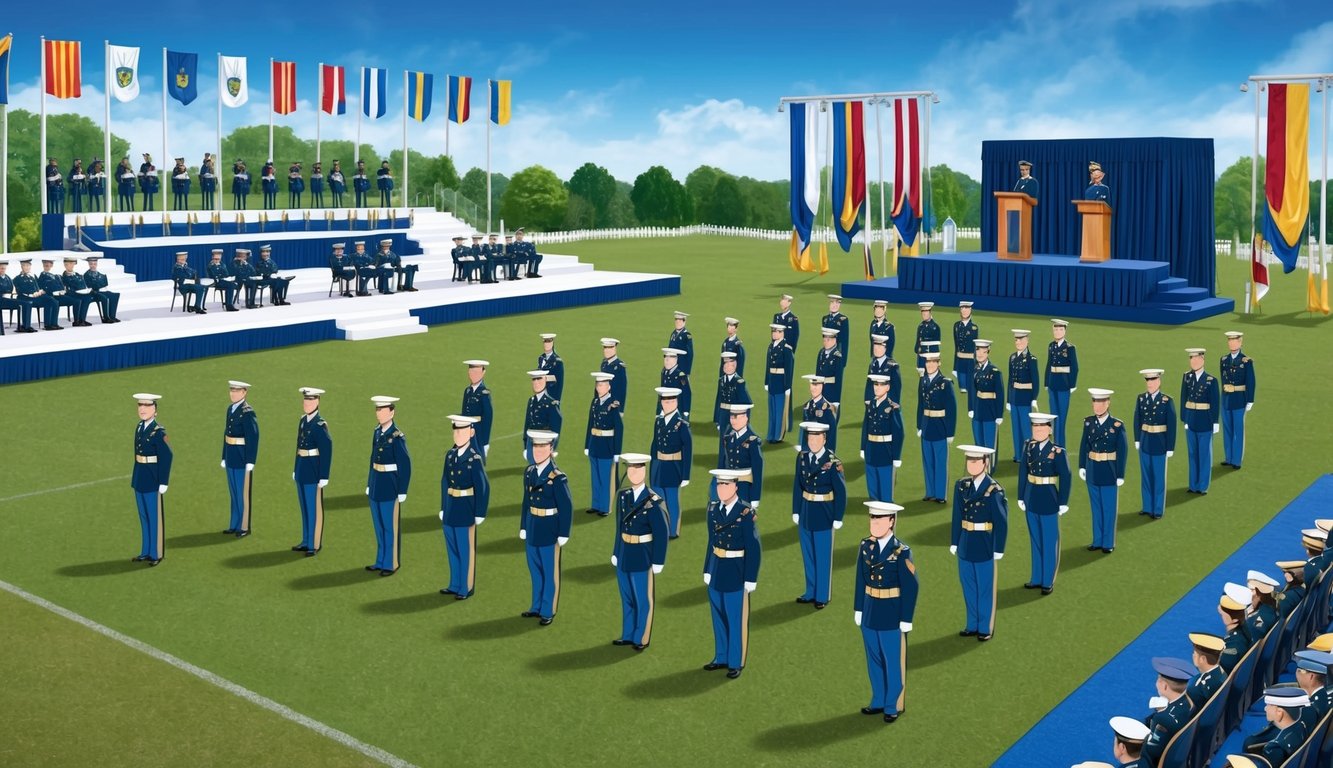
Graduation day symbolizes the conclusion of your loved one’s basic training voyage, marking an occasion for celebration, pride, and the initiation of new beginnings as recruits evolve into full-fledged service members.
Anticipated Events on Graduation Day
Arrive early to claim a favorable spot in the bleachers at the parade field, which is commonly used for Army basic training graduations.
Carry water and sunscreen, as ceremonies generally last one to two hours outdoors.
Expect to witness moving military displays and ceremonial proceedings.
Graduates will march in formation, showing off their discipline and skills.
Commanding officers will address the recruits’ accomplishments through speeches.
Spot your graduate in their sharp dress uniform, standing proudly on the blue lines marked on the field.
Be ready with your camera for this proud moment!
Ceremony Etiquette and Protocol
Dress appropriately in semi-formal attire to honor the significance of the event.
Avoid casual clothing such as shorts or flip-flops.
Be prepared for security screenings, including metal detectors.
Make sure to leave prohibited items in your vehicle to prevent delays.
Stand when instructed during the national anthem and other significant moments.
Keep quiet during official proceedings to hear vital information and directions.
After the ceremony concludes, wait for graduates to be dismissed before greeting them; this is the perfect time for heartfelt reunions and photographs with your new soldier.
Preparing for Your Visit
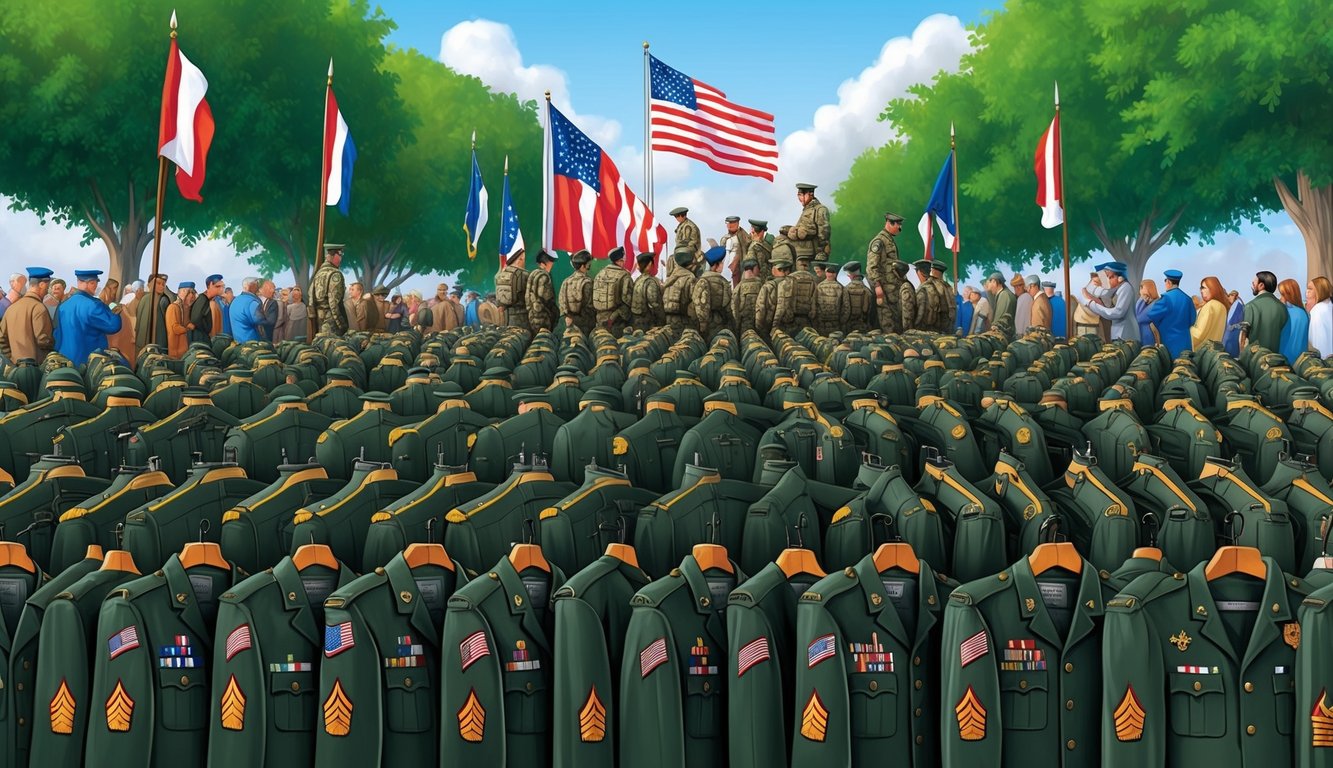
Attending the basic training graduation of your loved one is a thrilling experience that requires thoughtful planning, from arranging travel to ensuring compliance with base entry procedures.
Travel and Accommodation
Schedule your travel and lodging well in advance.
Fort Jackson is located near Columbia, South Carolina.
You might consider flying into Columbia Metropolitan Airport, which is approximately 20 minutes from the base.
Alternatively, Charlotte or Atlanta airports have more flight options but involve longer travel times.
Reserve a hotel early as accommodations fill rapidly during graduation weeks.
Many local hotels offer military discounts.
Some popular choices include:
- Holiday Inn Express & Suites Columbia-Fort Jackson
- Comfort Suites at Fort Jackson
- Hilton Garden Inn Columbia/Northeast
If you’re flying, renting a car is advisable due to limited public transportation.
Most major rental companies have offices at the airport.
Visitor Information for Fort Jackson
Entry to Fort Jackson requires proper identification.
Always bring a government-issued photo ID for all visitors aged 18 and older.
Non-U.S. citizens might need additional paperwork.
Arrive early on graduation day to allow sufficient time for parking and locating your seats, as traffic can be congested.
Typically, gates open at 7:00 AM for a 9:00 AM ceremony.
Wear comfortable shoes and attire suitable for the weather, considering that the ceremony often takes place outdoors at Hilton Field.
Bring water and sunscreen during warmer months.
Cameras are welcome, but large bags may face restrictions.
Consult Fort Jackson’s website for the latest visitor policy updates.
Life Post-Graduation
Graduating from basic training initiates your military journey.
You will proceed to specialized training, transitioning to active duty service.
Advanced Individual Training (AIT)
Following basic training, you will progress to Advanced Individual Training, where you will acquire the specific skills needed for your job role.
AIT duration varies depending on your Military Occupational Specialty (MOS), ranging from a few weeks to several months.
During AIT, you’ll delve into the technical elements pertinent to your position, gaining practical experience with the equipment and procedures specific to your job.
Though the intensity level is generally lower than basic training, military discipline remains enforced.
During AIT, you will enjoy increased personal time and freedoms.
Many facilities permit phone usage and civilian clothing during off-duty time, allowing for a smoother transition to military life while concentrating on career advancement.
Transitioning into Active Duty
After AIT, you will receive orders for your first duty station, marking your official entry into active service as a fully prepared soldier.
You may have the opportunity to take leave prior to reporting to your unit.
Use this chance to visit family and prepare for your relocation.
The Army will assist with transition and may grant a housing allowance if you’re living off-base.
Upon arrival at your new post, you will integrate into your unit and begin implementing your training.
A transition period is anticipated as you adapt to your new responsibilities, with senior soldiers providing guidance.
Traditions and Symbols
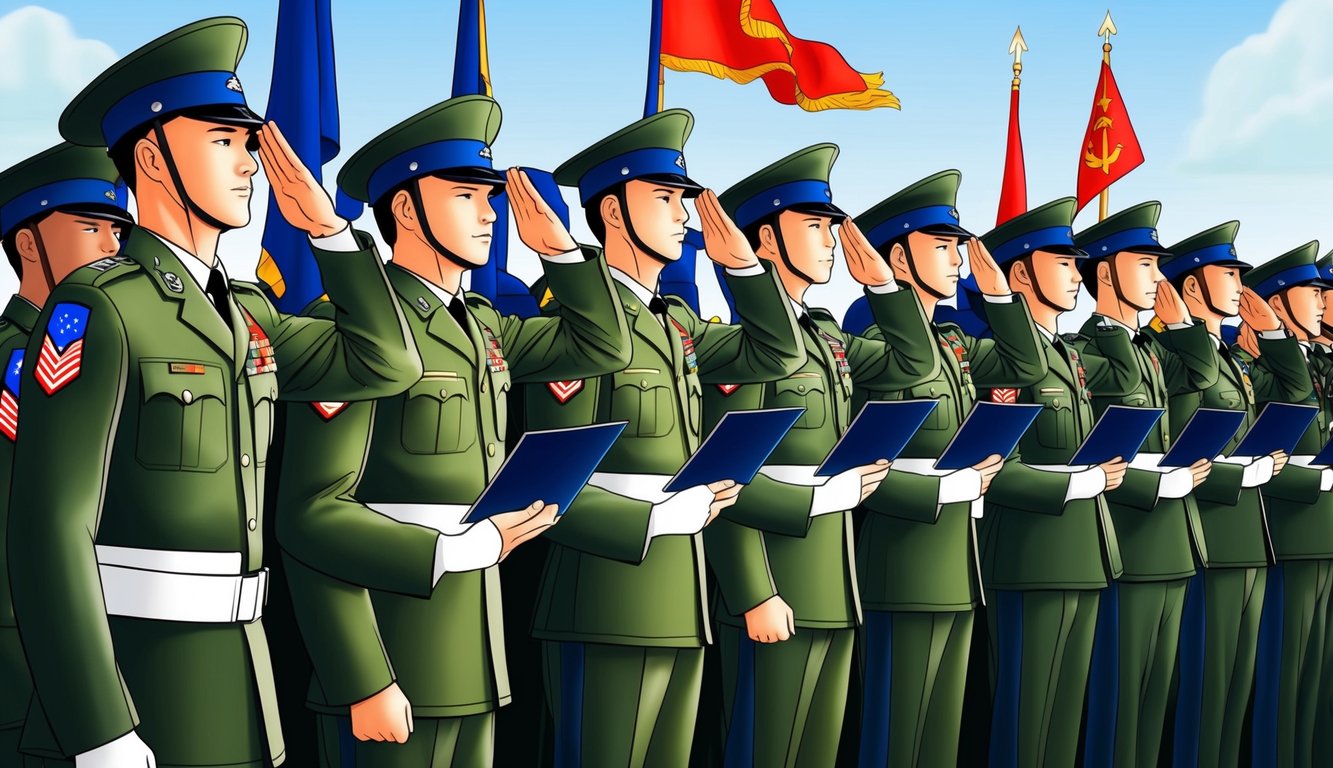
The graduation from basic training is rich in traditions and symbols that convey fundamental values and accomplishments.
You will engage with distinct military customs and emblems that embody your achievements.
Appreciating Military Traditions
During your graduation, you will participate in longstanding customs.
The Airmen’s Run exemplifies the unity and physical prowess of your unit, while the Coin Ceremony signifies your shift to Airman status with a special coin.
This tradition fosters camaraderie and recognizes your achievements.
The graduation parade stands out, showcasing your precision on the parade field.
Family members witness your transformation as you demonstrate your newly acquired skills.
The formal ceremony acknowledges your basic training completion, often featuring a guest speaker to inspire and commend you.
Meaning Behind Symbols and Colors
Symbols hold significant importance in military tradition.
The American flag prominently showcases your commitment to the nation you’ve pledged to defend.
Your uniform signifies professionalism and cohesion.
Each military branch has its unique colors; ultramarine blue and gold represent the Air Force.
The coin given during your ceremony serves as a physical token of your achievement and inclusion in the Air Force family.
Its design often incorporates branch-specific imagery and core values like “Integrity First, Service Before Self, Excellence in All We Do.”
Throughout the ceremonies, these values will be reiterated, serving as guiding principles for your military pursuits.
Practical Considerations
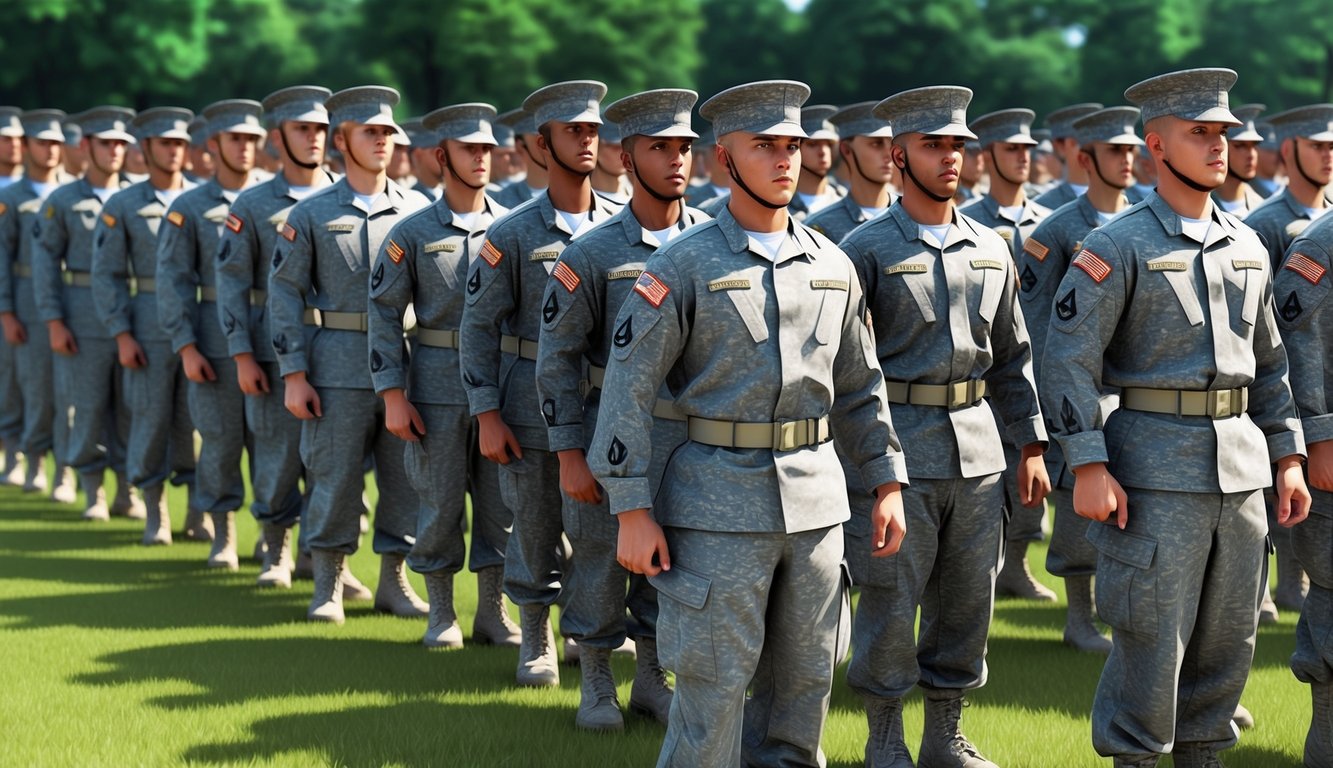
Preparing for basic training graduation necessitates meticulous planning and attention to detail, including adherence to military standards and financial management.
Grooming Standards
Military appearance is paramount on graduation day, requiring strict adherence to grooming codes.
Men should have neat, trimmed hair, not extending past the ears or collar, while women must secure their hair in a bun or a short style above collar length.
Male graduates must be clean-shaven, and both genders should maintain short, neat nails.
Jewelry should be minimal, allowing for only a plain wedding band if applicable.
Ensure your uniform is impeccably pressed and correctly worn, with polished boots reflecting your dedication to military standards.
Financial Preparedness
Managing your finances responsibly during basic training will set the stage for success.
Anticipate that your initial paycheck could be delayed, so have adequate cash on hand for immediate needs.
Setting up direct deposit for your military pay promptly is advised, along with allocating portions for savings and necessary expenditures.
You may require funds for:
- Personal items
- Phone calls home
- Graduation-related costs
Exercise caution with spending, avoiding significant purchases immediately post-graduation.
Instead, prioritize establishing an emergency fund.
Understanding your pay and benefits is critical; familiarize yourself with your Leave and Earnings Statement (LES) to maintain effective financial management.
Frequently Asked Questions
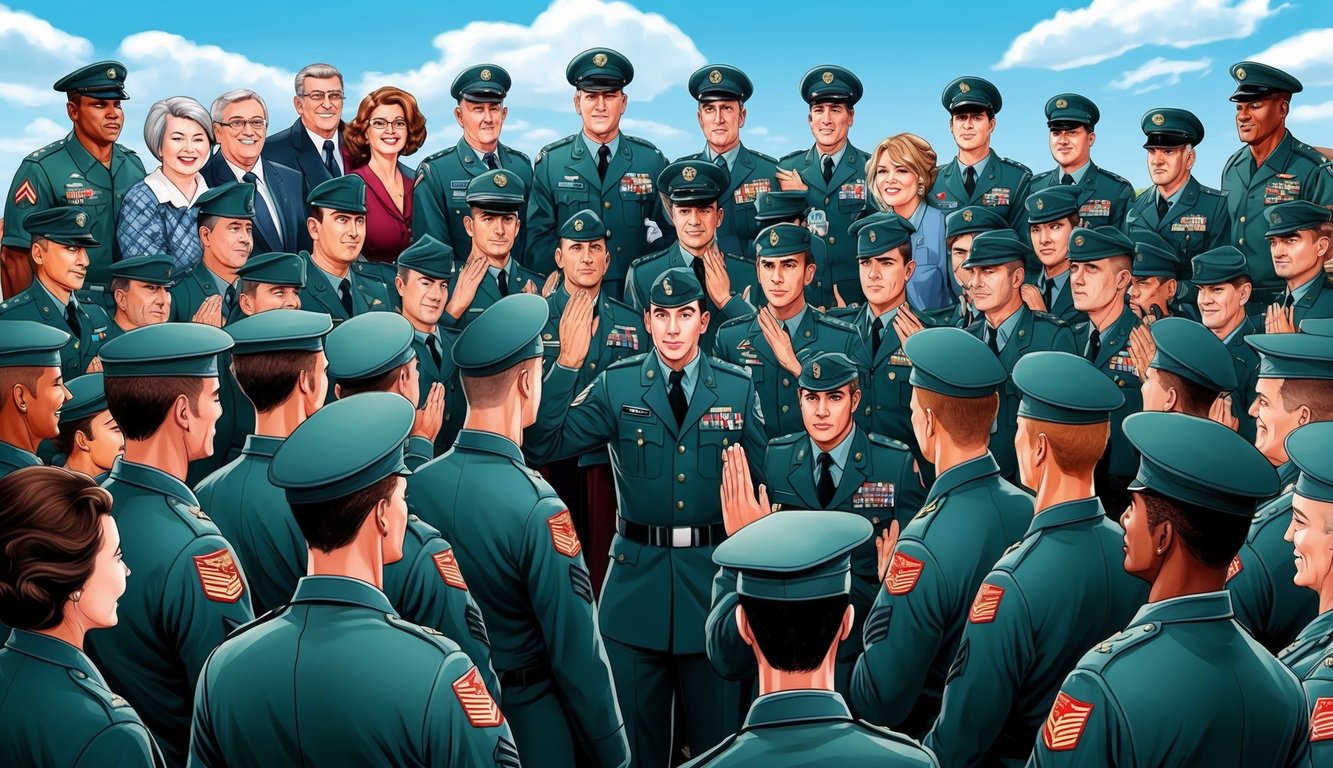
The graduation from basic training is a significant event for both new soldiers and their families.
Here are responses to some frequently asked questions regarding the ceremonies and procedures.
When are the upcoming graduation dates for Army basic training in 2024?
Specific Army basic training graduation dates for 2024 are not currently public.
For the latest schedule updates, consult the official Army website or reach out to your soldier’s training unit.
Graduations typically occur every few weeks throughout the year.
Can family members attend the graduation ceremony at Fort Jackson?
Yes, family members are welcome to attend basic training graduations at Fort Jackson.
You must adhere to base access protocols and arrive early.
Ensure you bring valid photo identification and be prepared for a security check.
What is the typical duration of a basic training graduation ceremony?
The duration of basic training graduation ceremonies typically ranges from one to two hours.
Events usually include speeches, unit demonstrations, and formal dismissals.
Prepare to spend most of the morning or afternoon at the ceremony.
Are there guidelines for photography during the basic training graduation?
Photography is generally permitted during most parts of the graduation.
However, avoid using flash during formal segments of the ceremony.
Follow any instructions provided by base personnel regarding photography restrictions.
What happens to soldiers right after graduating from basic training?
After graduation, newly minted soldiers usually have a brief time to spend with family before they depart for Advanced Individual Training (AIT) at their designated locations to acquire specific job skills.
What’s the guest policy for Air Force Basic Training graduations at Lackland Air Force Base?
Guests can attend Air Force graduations at Lackland AFB, albeit with a base pass and photo ID.
Arrive early for parking and security checks.
For the latest visitor policies, refer to the official Air Force BMT website.
“`

